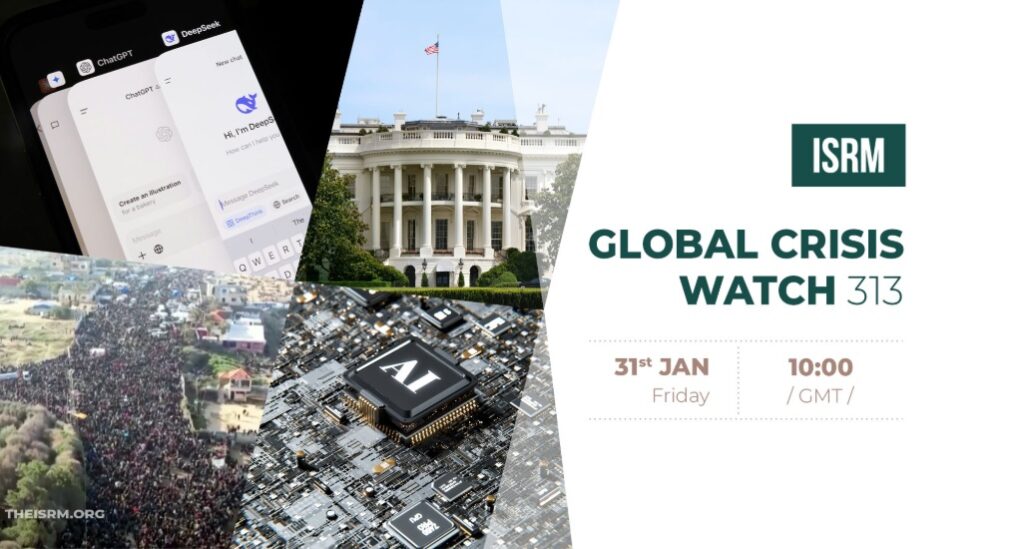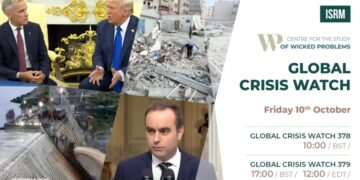The Institute of Strategic Risk Management (ISRM) has released a recording of its latest Global Crisis Watch, number 313, in which the group discussed various global events, including political unrest, technological advancements and potential impacts on social progress. They also touched on the rise of authoritarianism, the importance of cognitive diversity and the need for effective inclusion of diverse voices in decision-making processes.
Lastly, they shared concerns about the potential negative impacts of certain actions on global security, the importance of resilience and the complexity of international relations.
Andrew Blades discussed various global events and their implications. He mentioned the potential for an AI shock due to China’s advancements in the field, questioning whether these developments were solely Chinese or built upon existing technology. He also touched on the increasing interest in cryptocurrency, with central banks considering their own versions for stability. He then shifted to the US political scene, discussing President Trump’s actions such as freezing funds and considering changes to birthright citizenship. Lastly, he commented on Trump’s proposal to relocate Gaza residents, which he likened to ethnic cleansing.
Blades concluded by stating that Trump’s actions are consistent with his character and that his influence has grown significantly.
Political Unrest and Global Implications.
Marija Popadic discussed the ongoing political unrest in her country, with the Prime Minister’s resignation and massive student-led protests. The situation remains volatile, with the President having 10 days to decide on forming a new government or calling for snap elections in April. Popadic also mentioned the possibility of the situation worsening due to government supporters attacking student protesters.
Blades reflected on the similarities between the current political climate and that of 85 years ago, questioning humanity’s ability to adapt to the modern world. Ian Fox discussed the political implications of the recent national disaster in the US, attributing it to the country’s focus on diversity, equity and inclusion. He also emphasised the importance of challenging narratives that are demonstrably insane, as they can lead to adverse reactions.
Authoritarianism, Political Tactics, and Leadership
Fox expressed concerns about the rise of authoritarianism and the appeal of strong leaders among younger people in the UK. Blades discussed the political tactics of a certain leader, emphasising his focus on appealing to his base and lack of concern for other regions. Peter Dawe shared his analysis of how a particular leader operates and his plans to run for the executive mayor of Cambridgeshire, with the aim of dismantling ineffective systems. He criticised the government for not taking direct action and emphasised the importance of individual responsibility.
Public Service, Politics, and Resilience
Dawe expressed his potential interest in running for election in the future. Blades discussed the politicisation of public service in Australia, emphasising the need for public servants to serve the broader community rather than just their minister. Michael Crooymans, who recently joined the meeting, shared his concerns about the potential negative impact of Donald Trump’s actions on social progress and the escalating situation in Ukraine. He also mentioned the increasing focus on resilience and self-reliance in the Netherlands.
Concerns Over Trump’s Decisions and Impacts
Blades led the discussion, allowing Chris to share his thoughts on the current situation in the US, particularly regarding the Trump administration’s decisions and their potential impacts. Chris Miller expressed concern over the lack of “fearlessness” in the administration, citing the departure of the head of FEMA and the potential for more extreme decisions. He also discussed the ongoing issues in Australia, such as floods and fires and the potential for unrest in the UK due to social issues. Fox then shared his concerns about the potential for a resurgence of terrorism in the UK, while Andrew discussed the unintended consequences of banning certain symbols, such as the Nazi salute, and the potential for extremism to go underground. Finally, Dinesh Raj Bhattrai raised concerns about the potential impact of the US withdrawing from the Paris Agreement on developing countries like Nepal and Bangladesh.
Middle East and Africa Developments
The group discusses recent events in Lebanon, Syria and Africa. Blandon Smith reports on the hostage exchanges between Israel and Hamas, and mentions a drone incident involving Hezbollah. He notes that the ceasefire between Israel and Lebanon has been extended until February 18th. He also touches on developments in Syria, where Russia is reportedly asking for the former leader Assad to be handed over to the new government. In Africa, Mali, Burkina Faso and Niger have left the ECOWAS economic agreement, and Chad has removed all French military bases. Mike White comments on President Trump’s recent controversial statements and speculates about the situation in Syria. The discussion concludes with Blades comparing Trump’s political evolution to Windows operating system versions.
Diversity, Equity, and Global Security
The discussion covers several topics including diversity, equity and inclusion (DEI), organized crime and global security issues. Blades highlights the need for cognitive diversity and effective inclusion of diverse voices in decision-making processes. He questions how much diversity is necessary and emphasizes the importance of listening to challenging perspectives. Whit shares that some UK organisation leaders privately express concerns about the DEI agenda going too far. He draws parallels between DEI implementation challenges and issues in communist political systems. Euan Grant raises concerns about the lack of attention to Chinese and Russian influence in international security discussions, particularly in the context of a recent conference on Latin American security.
South Africa’s Political Landscape Uncertainty
In the meeting, White discussed the recent charges against the daughter of former South African President, Jacob Zuma and the potential implications for the country’s political landscape. He questioned whether this could lead to a new chapter in South Africa or potentially turn into something negative. Smith, who is not familiar with South Africa, deferred to others for an answer. Popadic and Miller also expressed their lack of familiarity with the situation in South Africa. Miller added that the country’s instability, language complexity and other issues make it a challenging place.
Counterterrorism, Empathy, and International Resilience
Miller discussed experiences in the counterterrorism field, highlighting the importance of police involvement and the complexity of air traffic control. Dawe shared his perspective on the need for empathy in understanding the motivations behind actions and the potential for corruption in decision-making. Grant emphasised the importance of listening to the Netherlands on issues of resilience, international trade, and criminality, and hinted at a significant development in the Bulgarian espionage case involving Montenegro.
Watch the recording, here
For more ISRM news, click here





